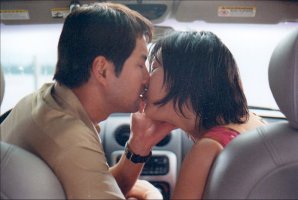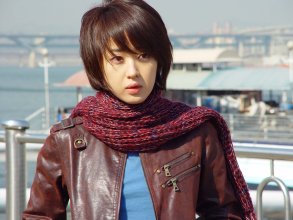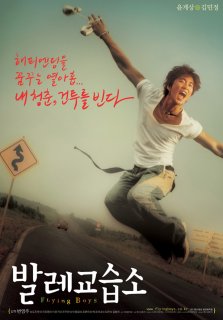An Interview with Byun Young-joo
by Adam Hartzell
Byun Young-joo's documentary The Murmuring (1995) was the first documentary to receive a theatre release in South Korea. Unfortunately, I have yet to see this film and the two others (Habitual Sadness - 1997 and My Own Breathing - 1999) that form a triptych on the plight of those forced into sexual slavery for the soldiers of the Japanese empire during World War II, often referred to as 'comfort women.' Byun received critical praise for her aesthetic approach within these documentaries along with her part in the efforts to obtain redress from the Japanese government for these women.
 I have seen her first fictional film, Ardor (2002, pictured right). The film is about the reinvigorating effects of an affair on a woman's previously disenchanting life. A sexually open film, many might not have expected such eroticism from Byun following previous works of such serious topics as sexual violence. Similarly, to continue on with a teenage, coming-of-age romance, such as she did with Flying Boys (2004, two photos below), Byun has developed herself into an elusive director when it comes to predicting what she is capable of next. Whereas some critics may find this disappointing, I find it refreshing and invigorating.
I have seen her first fictional film, Ardor (2002, pictured right). The film is about the reinvigorating effects of an affair on a woman's previously disenchanting life. A sexually open film, many might not have expected such eroticism from Byun following previous works of such serious topics as sexual violence. Similarly, to continue on with a teenage, coming-of-age romance, such as she did with Flying Boys (2004, two photos below), Byun has developed herself into an elusive director when it comes to predicting what she is capable of next. Whereas some critics may find this disappointing, I find it refreshing and invigorating.
Byun was in attendance at the 7th Far East Film Festival in Udine, Italy to screen Flying Boys, so I took the opportunity to interview her. Similar to my interview with Park Chul-soo, there are limitations in the trans-translation crossings. Again, Korean words were translated into Italian phrases which were then reworked into sentences back to me in English. However, added assistance of Korean-to-Italian was provided by another translator to double-check this aspect of the tiertiary translations. Five heads were working together as one. Because of the suspect required of such meta-translations, I will be creating a narrative around the interview rather than quoting Byun directly. (I have single quoted some phrases that were presented within the translation as specifically stated.) Also, let me pose a SPOILER alert for Flying Boys, since discussion of particular topics within this film requires mentioning major plot points.
The primary differences Byun sees in her two mainstream attempts, Ardor and Flying Boys, were aesthetic, that is, the positioning of the camera and the colors. Otherwise, she does not see a difference between her approach to Documentaries or Fiction films. The most important aspect in making any film for her is the relationship between the director and the producer. Byun has been blessed to work with the same producer from The Murmuring onward, that being Kim Mi-hee. Such an ongoing, familiar relationship has helped Byun tremendously and puts her at ease on the set.
The big difference in her approach arises when she is making an Independent film as opposed to a Mainstream film although this difference was not elaborated upon. Concerning the response to Flying Boys, Byun said that critics felt as if they were watching a 'rugby game', not sure what direction she was taking. The critics also had trouble placing the film. I took this to mean how to place the films into particular genres or what to think of the film, but I could be mistaken on what was intended by that comment.
 Byun said that she gets most of her inspiration from moments that capture her while filming, moments that evoke emotion in the process of making the film, rather than planning out scenes and emotional effects. For example, she had the characters in Flying Boys take about two months of ballet classes so they could grasp the basics of the form. She didn't want her actors and actresses to learn ballet expertly; she simply wanted it to look like dance. The dance recital portrayed within the film was not intended to be an excellent example of classical ballet, simply characters enjoying themselves, valuing their lives. And while watching these classes, she found much inspiration for scenes in the film.
Byun said that she gets most of her inspiration from moments that capture her while filming, moments that evoke emotion in the process of making the film, rather than planning out scenes and emotional effects. For example, she had the characters in Flying Boys take about two months of ballet classes so they could grasp the basics of the form. She didn't want her actors and actresses to learn ballet expertly; she simply wanted it to look like dance. The dance recital portrayed within the film was not intended to be an excellent example of classical ballet, simply characters enjoying themselves, valuing their lives. And while watching these classes, she found much inspiration for scenes in the film.
Byun actually doesn't like ballet or classical dance at all. But there were three reasons why she chose to explore the cinematic possibilities of this art form within the coming-of-age romance genre. First, putting stockings on men enables one to show the male body without attaching any importance to nudity. Second, the actors actually didn't want to do the scene where they first put on the stockings. However, Byun obliged them to do this very scene because she wanted to demonstrate that sometimes we have to do futile, useless things to get on. And third, she wanted to show that winning or losing is of no importance, something the dance recital clearly demonstrates.
Outside of the genre-defying, amateurish joy of the dance recital within Flying Boys, I also appreciated Byun's efforts to push for new visions of gender roles and sexuality in South Korean cinema. Flying Boys is not a perfect film in any way. Too many scenes are forced into being and there is too much disruption of the flow for me to praise it as one of the better South Korean films of 2004, which was a pretty lackluster year. However, I find Byun's efforts as worthy of analysis about what changes are possible regarding gender roles and sexual diversity within South Korea. Also, she does this without fooling the audience regarding the reality of gender and sexual lives of youths in South Korea. This is particularly prominent when Soo-jin's character gets beat up on the streets of Seoul by some thuggish young men. Although Soo-jin is permitted some room to breath concerning gender and sexual roles traditional Korean views would require of her, this scene of her getting beat up returns us to the reality that is always there in all societies where such roles are actively surveilled and transgressors of said roles are punished. Byun wanted to include this scene because she was witness to a similar real life incident. It particularly stuck with Byun how people just passed by as the incident was happening, refusing to intervene.
 Such back and forth of freeing and constraining realities is part of the complicated situation in South Korea today that Byun wanted to show, how the Traditional and Western exists at the same time. To increase the quality of life and make this world a better place, Byun feels it is necessary to break from the traditional beliefs because things have gotten stuck. Furthermore, Byun has two clear intentions with each film. First, she wants to show people with 'hearts that hurt' and how lessons from them can help us improve our worlds. Byun intends for portrayals of the struggles of minorities to allow for these lessons. Specifically with Flying Boys, she wanted to show how lower classes and Gays and Lesbians are on the same level of being outside everyday, mainstream society. Both groups can experience identity crises through their distance from those who claim to be above them in society. Yet both groups often try and achieve more in life, get more value out of life, and are more mature in a lot of ways. I find Byun's intent to present solidarity between the lower classes and sexual minorities as quite a progressive perspective considering how, in my own country of the United States of America, said groups are often pitted against each other via the homophobic talking-head tactics of the right-wing media or the misguided elitism of some of my fellow left-wing critics. Byun's effort to heighten similarities seems to me a more productive approach.
Such back and forth of freeing and constraining realities is part of the complicated situation in South Korea today that Byun wanted to show, how the Traditional and Western exists at the same time. To increase the quality of life and make this world a better place, Byun feels it is necessary to break from the traditional beliefs because things have gotten stuck. Furthermore, Byun has two clear intentions with each film. First, she wants to show people with 'hearts that hurt' and how lessons from them can help us improve our worlds. Byun intends for portrayals of the struggles of minorities to allow for these lessons. Specifically with Flying Boys, she wanted to show how lower classes and Gays and Lesbians are on the same level of being outside everyday, mainstream society. Both groups can experience identity crises through their distance from those who claim to be above them in society. Yet both groups often try and achieve more in life, get more value out of life, and are more mature in a lot of ways. I find Byun's intent to present solidarity between the lower classes and sexual minorities as quite a progressive perspective considering how, in my own country of the United States of America, said groups are often pitted against each other via the homophobic talking-head tactics of the right-wing media or the misguided elitism of some of my fellow left-wing critics. Byun's effort to heighten similarities seems to me a more productive approach.
Second, she wants to show people who have everything yet do not value life as much as they should that they should indeed value their lives. She demonstrates how the minority characters can teach the privileged characters about how it is possible to improve their lives. In Flying Boys it is the Gay older brother figure who guides Soo-jin and it is the lower-class classmate who challenges Min-jae. Byun always wants to show that it is possible to snap out of a monotonous life through the will to change your life, to get rid of stereotypic thoughts. Sometimes she's managed to get this message across, and other times she has not. From the lack of critical and popular reception of Flying Boys, we can assume this film was an example where her message was not successfully realized.
I wish I could have asked Byun more and clarified more. I wish I knew Korean better so I could confidently quote her. Alas, like Flying Boys, we all have our limitations. I've done what I can to surmount them here.
UDINE April 29, 2005
Of course, none of us can surmount the obstacles life places in front of us without the combined assistance of others. In this case, I'd like to thank the entire staff of the 7th Far East Film Festival in Udine, Italy for bringing Byun Young-joo to the festival so that I might interview her, I'd like to thank Director Byun for tolerating the monotony of multiple interviews and multiple translations, and I'd like to thank the patient translators - the primary Korean-to-Italian translator, Jeong Koo; the Korean-to-Italian double-checker, Choi Yoon-jun; and Italian-to-English translator Tom De Smet.